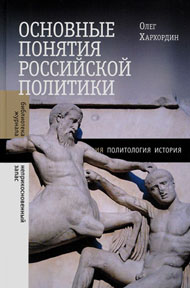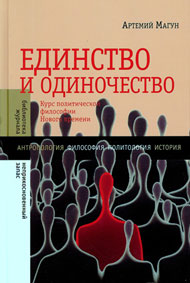
Oleg Kharkhordin. Main Concepts of Russian Politics
Series “Magazine Library 'Neprikosnovenny Zapas'”
Moscow: New Literary Observer, 2011. p. 328.
ISBN 978-5-86793-886-4
This book is the product of dialogue between English and Russian speaking political thinkers. Having taught political theory at the end of the 1990s and at the start of the millennium, both at the European University in St. Petersburg and in leading American institutions, the author constantly encountered the problems of cross-cultural translation. How does one, for example, explain to an American or Western European student the specifics of the Russian term “gosudarstvo” and the Russian phenomenon surrounding this? Similarly, how can one explain to a Russian student the hidden religious roots of the western concept of a civil society?
The book centres around two basic approaches . The first, a research of the history of concepts, which highlights pragmatic aspects of situations, not obvious when combined with basic political terminology in Russian and the second, a study within the boundaries of classical republican tradition allows for a different understanding of familiar concepts of liberal discourse predominant nowadays.

Artemy Magun: Unity and Solitude: A Course in the Political Philosophy of Modernity
Series “Library of the Magazine 'Neprikosnovenny Zapas'”
Moscow: New Literary Observer, 2011. – p. 544
ISBN 978-5-86793-890-1
The new book by political philosopher Artemy Magun, Associate Professor at the Department of Liberal Arts and Sciences at St. Petersburg State University and Associate Professor at EUSPB, is at once a text book about the political philosophy of modernity and a treatise about the very essence of politics. The book examines the most influential systems of political thinking in which the reader is drawn into the rich discussion of the union and disunion of people, which to the present day, for understandable reasons, remains little absorbed into Russian culture and politics. The philosophical introduction to the book deals with the dialectic of positive and negative unity – unity and solitude – and flows naturally from the ideas developed by the author in “The Negative Revolution”. The aim of the book as a whole is to bring the idea of the political closer to that of the everyday and the existential experience of all, thus pointing to the intimate character of this sphere, which occurs to many as simply superficial and technical.
This publication is recommended by the EMA (Education and Methodics Association) for interdisciplinary educational programmes as a training aid for “Arts and Humanities”.


















